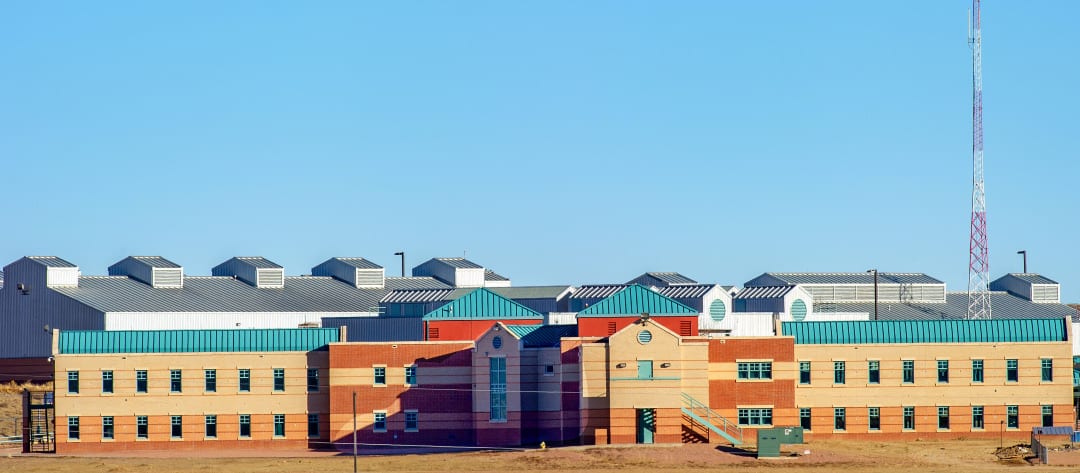Likely more than half of the people held in Colorado prisons have been infected with the coronavirus, one of several astonishing numbers included in a report released Thursday that calls for incarcerated and detained individuals to be prioritized for the COVID-19 vaccine.
The report comes from the Colorado Health Institute — a nonpartisan health policy think tank. Researchers at the institute gathered data from official state and federal sources.
COVID-19 IN COLORADO
The latest from the coronavirus outbreak in Colorado:
- MAP: Cases and deaths in Colorado.
- : Get up-to-date information.
>> FULL COVERAGE
Outbreaks at county jails, state and federal prisons and federal immigration detention facilities have accounted for more than 16,000 infections, including more than 13,000 among people who are incarcerated or detained. Thirty-two people have died in those outbreaks.
Outbreaks at just state and federal prisons have led to more than 9,000 infections among inmates. This includes at the most secure prison in America — the federal Supermax prison in Florence — where, even though most of the inmates live under 23-hour-a-day lockdown, federal officials have still reported three COVID-19 cases among inmates and another 28 among staff.
Estimating prevalence rates is difficult in facilities where people are frequently moved or released. But the report concludes that more than half of people incarcerated in Colorado have been infected with the coronavirus.
“It’s safe to say that for every 1,000 prisoners in Colorado, 557 incarcerated people have been reported as COVID-positive,” the report states.
Infection rates for people held at the federal immigration detention facility in Aurora are likely similar, the report found. The facility has reported 151 cases among detainees and 122 cases among staff. Currently, there are about 230 people detained at the facility.
All told, jails, prisons and detention facilities account for 1 out of every 24 COVID-19 cases reported in Colorado. The settings are second in terms of case numbers only to long-term care facilities, which have accounted for more than 22,000 cases, according to the report.

Incarcerated individuals were prioritized for COVID-19 vaccines in the state’s initial plan, but the plan was changed after Gov. Jared Polis said he didn’t support the idea. Currently, people in prisons and jails in Colorado will receive the vaccine at the same time as members of the general population, according to age and medical condition.
The Colorado Health Institute Report argues that removing people in jails and prisons from the priority list is a departure from the state’s goals of ensuring equity in vaccine distribution.
“The choices we are making about how to prioritize vaccinations speak to how we value health equity in ways beyond rhetoric,” Michele Lueck, the institute’s president and CEO, said in a statement. “This is an opportunity for the state to operationalize equity.”
People of color are over-represented in Colorado’s prison population. People who are Black, Hispanic and American Indian make up 53% of the state’s prison population, but only 29% of the state’s overall population.
“In other words, the rampant spread of COVID-19 in Colorado prisons and jails falls disproportionately on Black, Latinx, and Native people — communities that have borne the brunt of the pandemic both inside and outside of the carceral system,” the report states.
Health groups nationally have also called for incarcerated individuals to be prioritized for coronavirus vaccines because they are unable to socially distance, making them more likely to both catch and spread the virus. Targeting sources of outbreaks better protects entire communities, experts have argued.
Mask rules and other safety measures have varied from jail to jail; the jail in El Paso County was ordered by a judge to better protect inmates from COVID-19 following a lawsuit. As advocates have called for prison and jail populations to be reduced to protect inmates with underlying health conditions and to limit crowding that can help spread the coronavirus, judges have often rejected requests for “compassionate release.”
“A serious, possibly deadly disease is not a part of a prison or jail sentence, and individuals who are incarcerated or detained are released back into society daily, putting communities at risk,” Karen McNeil-Miller, the president and CEO of the Colorado Health Foundation, the state’s largest foundation, said in a statement that accompanied the release of the report. “By protecting all of our correctional frontline workers, along with anyone in custody, we better protect Coloradans and their communities from this pandemic.”
This content was originally published here.

